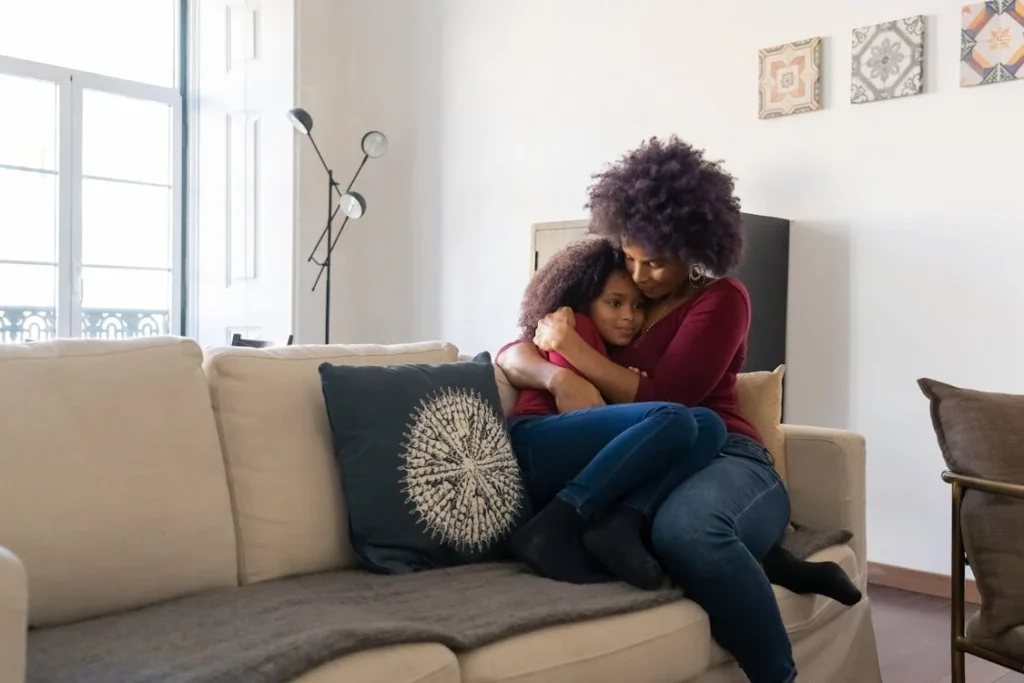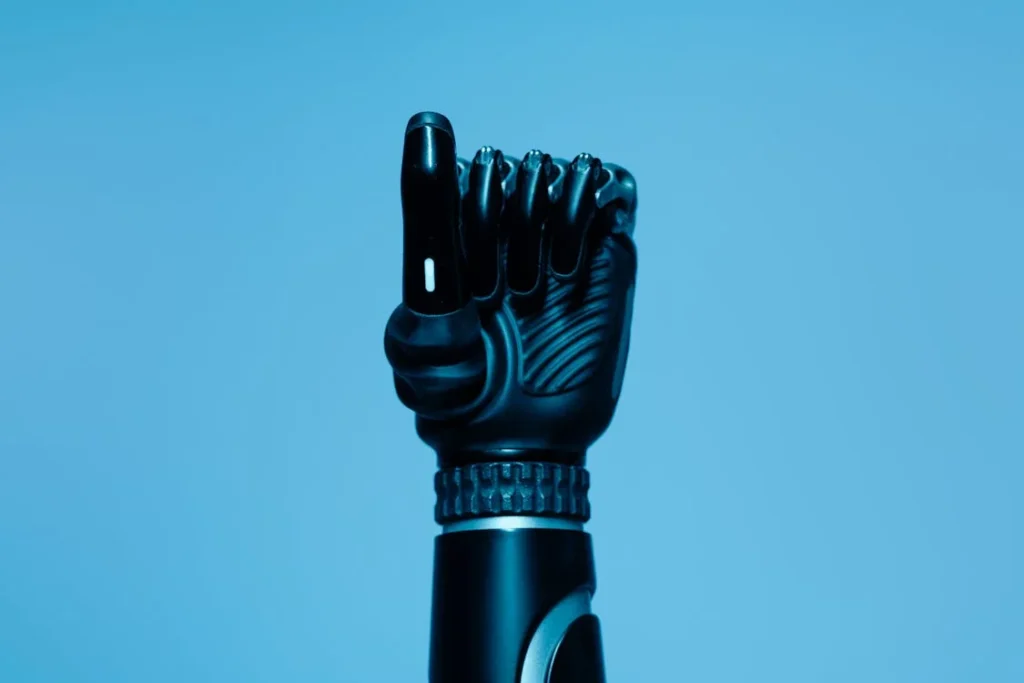When a child begins to use a prosthetic, the focus is often on the physical side—fitting, walking, holding, learning how to move again. But there’s another side that matters just as much: how they feel inside.
For many children, wearing a prosthetic brings a mix of emotions. Some feel proud and strong. Others feel unsure, nervous, or even sad. These feelings can shift over time, and they are just as important to understand as the physical process.
As a parent, you play a big role in helping your child adjust—not just to the limb, but to how they see themselves.

Understanding a Child’s Emotional Response
When a child receives a prosthetic, the change is not only on the outside. Their thoughts, feelings, and sense of identity all go through a shift.
Some children adjust quickly, especially if they’ve grown up with a limb difference since birth. For others, especially those who experience limb loss later, the emotional journey can take more time.
Children often don’t have the words to explain what they’re feeling. You might see signs instead—mood changes, withdrawal, frustration, or suddenly losing interest in things they used to enjoy.
These reactions aren’t always about the prosthetic itself. They often reflect deeper thoughts like, “Will I be able to do what my friends do?” or “Will people look at me differently?”
This is why it’s so important to create a space where your child feels safe sharing. Start with gentle questions. Ask how the prosthetic feels, not just physically, but emotionally.
Listen without rushing to fix things. Just being heard can help a child feel more in control and less alone.
Identity and Self-Image
Children are constantly building their sense of self—how they see themselves, how they think others see them, and how they fit into the world. A prosthetic can influence all of this. For some kids, it becomes a source of pride.
They might see it as something special, even powerful. For others, it can feel like a sign that they’re “different,” and that feeling can make them want to hide.
These thoughts often show up in quiet ways. A child might avoid group activities. They might wear clothes that cover their limb or hesitate to answer questions from friends.
These are normal reactions, but if they continue for too long, they can affect self-esteem.
The goal isn’t to push a child to be confident right away. Instead, help them build confidence gradually. Encourage activities that help them feel capable.
Show them examples—other children or adults who use prosthetics and lead full, happy lives. Representation matters, especially when kids are looking for someone who looks like them and lives freely.
Reactions from Others
Children notice how people react to them. A stare, a comment, or even silence can stay in their minds for days. Some kids become very sensitive to these responses. They might pull away socially or start avoiding places where they feel watched.
As a parent, it helps to prepare your child for different reactions. Talk through what someone might say and how they might respond. Sometimes just knowing what to say back makes the situation easier to handle.
You can even role-play these moments together. It helps take the fear out of unexpected attention and gives your child tools to stay confident.
At the same time, you can also speak to teachers, caregivers, and family members to help them understand how to support your child in a respectful and open way.
When the people around them respond with kindness and normalcy, it teaches your child to do the same for themselves.

The Role of Parents in Emotional Adjustment
Parents are the first and most important source of comfort for a child going through change. When a child starts using a prosthetic, it’s not just their life that shifts. Yours does too.
You may feel hopeful, nervous, protective—or all of these at once. These feelings are normal. But how you respond to your child’s emotions can make a big difference in how they cope and grow.
Your child is always watching, even when you don’t realize it. If you approach their prosthetic with openness and calm, they’re more likely to feel secure.
If you seem tense, overly protective, or uncomfortable, they may begin to doubt themselves or feel like something is wrong. It doesn’t mean you have to hide your worries. It just means being aware of how you express them.
One of the best things you can do is to treat the prosthetic as something normal—not something special or strange. If you help with it during the day in the same way you might help them put on shoes or brush their teeth, your child will start to see it as part of their routine, not as a spotlight.
Building Trust Through Routine
Children often feel safest when life is predictable. Creating simple routines around their prosthetic—cleaning it, putting it on, taking it off—can help build comfort and reduce anxiety. These routines become little anchors in their day, moments where they feel capable and in control.
When these routines are handled gently and patiently, they also become opportunities for connection. A few quiet minutes each morning, adjusting the fit or helping with straps, can be moments of calm encouragement.
Over time, these small things add up. They tell your child: “You’ve got this. And I’m here if you need me.”
It’s also important to allow space for your child to do things on their own, even if it takes longer or feels messy at first. Independence builds confidence.
If your child wants to try putting on their limb alone or carry something a little heavy, give them room to try. Help when needed, but always let them lead when they’re ready.
Emotional Ups and Downs Are Normal
There will be good days and hard ones. Sometimes, a child may feel proud of using their prosthetic. The next day, they might feel tired or frustrated by it.
These changes in mood are not a sign of failure—they’re part of adjusting to something new. Even adults go through emotional waves when learning to live with a prosthetic.
It helps to let your child know that having mixed feelings is okay. They don’t need to “stay strong” all the time or pretend everything is fine. What matters more is that they feel safe talking about those feelings and know they’ll be supported, no matter what.
As a parent, your steady presence is more powerful than any speech or pep talk. Being there, listening, and showing belief in your child—even on the days when they struggle—can be the most healing thing of all.

Social Experiences and Peer Interactions
As children grow, their world expands beyond home. School, playgrounds, sports, and birthday parties become part of their everyday life.
These spaces are filled with other kids—some curious, some kind, and others unsure of how to react to someone who looks or moves a little differently. For a child with a prosthetic, these moments can shape how they see themselves in the larger world.
Early social experiences play a big role in emotional development. A warm comment from a friend, an inclusive teacher, or just being chosen for a team can boost a child’s confidence.
On the other hand, a stare, a question asked too loudly, or being left out—even without intention—can leave a lasting impression.
Children notice these things deeply. They may not say much, but their behavior often tells the story. They might become quieter in class, pull back from group activities, or avoid showing their prosthetic in public.
These are all ways of protecting themselves from feeling different or judged.
Helping Your Child Navigate Social Spaces
As a parent, you can help prepare your child for these situations. Talk openly about what others might notice and say. Explain that most people don’t mean harm—they’re just curious or unfamiliar.
When children are ready for these moments, they feel less caught off guard.
Some children like having simple answers ready when someone asks, “What’s that on your arm?” or “Why do you walk like that?” Practicing responses at home can make these questions easier to handle.
Some kids even enjoy explaining their prosthetic. Others prefer not to talk about it much. Either approach is okay, as long as it helps your child feel in control.
You can also speak with your child’s teachers or coaches to make sure they understand what your child needs—both physically and emotionally.
Most educators want to help but may not know how unless you guide them. A simple conversation about how your child uses their prosthetic and what kind of support feels helpful can go a long way.
Friendships and Belonging
Having a few strong friendships can make all the difference. Children who feel accepted by their peers are more likely to feel good about themselves. They’re more willing to try new things and less afraid of being judged.
That’s why it helps to create chances for your child to connect with others in low-pressure settings. Playdates, group games, or small team activities allow them to build bonds at their own pace.
When children experience inclusion early on, they’re more likely to believe they deserve it—and more likely to ask for it when it’s missing.
Peer support also grows stronger when other children are educated about differences in a simple, kind way. Some parents choose to speak briefly to classmates about their child’s limb difference.
Others ask the teacher to do it gently. These short conversations help shape an environment where curiosity turns into understanding, and difference becomes just another part of normal life.

Building Long-Term Emotional Strength
Helping a child adjust to life with a prosthetic is not a one-time task. It’s a continuous process that unfolds with each stage of growth. The emotional needs of a toddler just learning to walk are very different from those of a teenager figuring out who they are.
What stays the same is the need for support, encouragement, and a sense of belonging.
As your child gets older, they will start to ask deeper questions. They might wonder, “Why did this happen to me?” or “Will I always need this?”
These moments can be difficult, but they are also chances for connection. When your child opens up, try to listen fully. Avoid rushing to provide the perfect answer. Sometimes just sitting with the question together is enough.
Teenagers, especially, may wrestle with identity. They’re at an age where fitting in often feels very important. They may not want to stand out, and their prosthetic might feel like a symbol of difference.
This is when quiet confidence matters most—not just in your child, but in how you talk about their limb and how you reflect their worth back to them.
Encouraging Ownership and Independence
As children grow, it’s important to let them take more ownership of their care. That means slowly stepping back and letting them manage daily tasks like cleaning, wearing, and adjusting their prosthetic.
These small responsibilities help children feel capable and independent.
Even more important is giving them space to make their own choices—about how they use their prosthetic, what activities they want to try, and how much they want to talk about their limb difference.
Your role becomes more about support and less about control.
Of course, guidance is still important. Children may make mistakes, forget steps, or become frustrated. But when you allow them the room to figure things out—with your steady support in the background—they grow not just in skill, but in confidence.
The Importance of Mental Health Support
There may be times when your child’s emotional struggles go deeper than what can be helped by daily encouragement alone. If they seem withdrawn, anxious, or overly upset for long periods, it might be time to seek help from a child psychologist or counselor.
There’s no shame in needing extra support. Just as your child sees a prosthetist to care for their limb, they can see a therapist to care for their mind.
These professionals can help children express feelings they don’t yet know how to explain, work through grief or anxiety, and develop coping tools that will serve them for years.
Therapy can also be helpful for parents, especially if you’re feeling overwhelmed or unsure of how to support your child. Talking to someone trained in family or pediatric care can help you feel more confident and less alone.

Expressing Feelings Through Creativity and Play
Children often understand and process their emotions through more than just words. For many, play and creative expression offer safe, natural ways to explore feelings they don’t fully understand yet.
This becomes especially important for children adjusting to life with a prosthetic. While adults tend to focus on practical goals—mobility, independence, care routines—kids are trying to make sense of what it all means through the language they know best: imagination.
Art as a Mirror of Emotion
Drawing, painting, building with blocks, or even molding clay can help a child express how they feel about their limb or prosthetic.
Without needing to explain anything, they might draw a version of themselves climbing, running, or even with a superhero-style prosthetic arm.
These creative moments can be windows into your child’s inner world—what they hope for, what they fear, and how they’re starting to shape their identity.
You don’t need to be an artist or therapist to encourage this. Just give your child space and materials, and let their ideas lead the way. If they draw something related to their prosthetic, don’t rush in with praise or correction.
Instead, ask open questions like, “Tell me about this part,” or “How did you come up with that?” These kinds of conversations help your child feel heard without being directed.
Some children may draw their prosthetic in bold colors, giving it features like rockets or claws. Others might avoid drawing it at all. Both are fine. What matters is giving them a space to explore, without pressure or judgment.
Storytelling, Pretend Play, and Self-Discovery
Many young children use storytelling and pretend play to work through real-life experiences. They may act out hospital visits with stuffed animals, or pretend one toy “needs help putting on its leg.”
These games may seem simple, but they can actually be deeply healing. They allow children to take roles of power, control, and care—especially in situations where they’ve felt small or uncertain.
Joining your child in these games without taking over can strengthen your bond and give them the support they’re looking for in that moment.
If they pretend to be a doctor, be the patient. If they want to give their toy a prosthetic, help them tape one together with paper and string. Through play, they’re telling their own story—and making sense of a world that changed.
Older children may not play in the same way, but they can still benefit from storytelling. Writing short stories, recording voice memos, or keeping a simple journal can give them a private space to work through thoughts.
If your child enjoys reading, offer books with characters who have limb differences or who go through challenges and come out stronger. These kinds of stories can build connection and inspire hope, especially during harder days.
Creativity as Confidence
When children create something—whether it’s a picture, a dance, a story, or a cardboard robot—they feel a sense of control and pride. This matters more than most people realize.
It tells them, “I can build things. I can imagine. I can do something completely my own.” For a child adjusting to a prosthetic, these moments build the same kind of confidence that physical therapy might—just in a different way.
Creativity is not a substitute for medical or emotional support, but it can be a quiet, powerful tool in helping children grow into themselves. It gives them freedom to explore, express, and define who they are—on their own terms.

Cultural and Community Influence on Emotional Adjustment
How a child feels about their prosthetic is not shaped only by what happens at home or in school—it is also shaped by the world around them.
The beliefs, values, and attitudes of the community they live in can have a strong impact on how they see themselves.
In a country as diverse as India, where family ties are strong and traditions run deep, cultural context plays a major role in emotional development.
The Power of Social Norms
In some communities, disability is still surrounded by silence, pity, or even stigma. Though attitudes are slowly changing, a child with a visible prosthetic may face curious looks, intrusive questions, or whispered remarks.
These experiences, especially when repeated, can lead to self-doubt or a desire to hide their limb.
On the other hand, in supportive communities where diversity is openly accepted, children often feel more comfortable and confident.
When they see neighbours, shopkeepers, teachers, and extended family treating them with kindness and respect, they are more likely to accept themselves fully. The way others react tells the child whether they belong—and belonging builds emotional safety.
Parents often find themselves in the middle of these cultural reactions, trying to protect their child while navigating what people might say or think.
This pressure can be overwhelming. But one of the most helpful responses is to start small—by educating close family members, correcting misunderstandings gently, and modeling open, positive language around the child’s limb.
Celebrating Strength, Not Hiding Difference
In many cultures, there is a tendency to avoid talking about difficult things. Families may avoid discussing the limb difference with others, or they may worry about how it will affect marriage, schooling, or social status in the long term.
While these concerns are real, hiding the prosthetic or treating it as something to be ashamed of only reinforces negative beliefs—for both the child and the people around them.
Instead of hiding, families can work on reframing the story. A prosthetic is not a secret. It is a support tool. A sign of strength. A symbol of adaptation and resilience.
When parents begin to speak about it with pride, even in small ways—like answering questions openly, or sharing a moment of progress with relatives—it changes how others see the child. More importantly, it changes how the child sees themselves.
Some families also find strength in local storytelling traditions. Sharing stories, folk tales, or religious examples of characters who overcame challenges can create powerful emotional bridges.
Children feel connected to something bigger than their current struggle, and they begin to see themselves as part of a proud story of resilience.
The Role of Community Events and Representation
Involving children with prosthetics in public events—sports, dance, art exhibitions, cultural festivals—can be a quiet but powerful act of inclusion. When they are seen not for what’s missing, but for what they’re doing, they begin to take up space with confidence.
Community leaders, teachers, and event organizers can play a helpful role by making these spaces accessible and welcoming. And when families see other children with prosthetics—at clinics, in parks, or online—it reminds them they are not alone.
This shared visibility encourages acceptance and normalizes differences for everyone.
Conclusion
A prosthetic may support a child’s body, but it’s their emotional world that truly shapes how they grow. Confidence, belonging, and self-worth are not built in one moment—they’re shaped slowly, through everyday interactions, small wins, and the steady presence of those who care.
As a parent, your support, patience, and understanding make a lasting impact. By encouraging open conversations, allowing space for creativity, and helping your child feel seen—not just for their limb, but for who they are—you create the foundation for resilience.
Children don’t just need a prosthetic that fits. They need a life that fits them—a life where they can feel proud, included, and strong. And with the right care, community, and love, they will.



